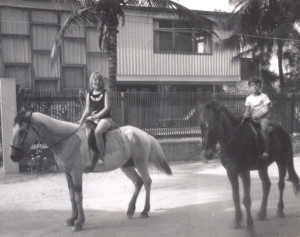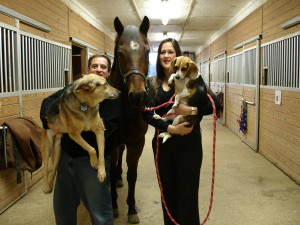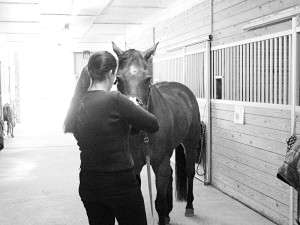By Debra Zimmerman Murphey
When I was a child and our family lived in Bangkok during one of my father’s early State Department assignments, I fell in love with horses when I climbed onto one in Pattaya, Thailand, on a family vacation. I was a shy, gawky kid, but my memory tells me that atop that horse, I was regal.
I didn’t own or learn to ride a horse until many decades later, but I think I had a sense even then that connecting with a horse and being able to properly handle and ride one would be magnificent and freeing. Time and a retired show horse – bred to be Ima Carousel Cody but loved as Pee Wee – proved me right.

My husband, Maury Tobin, loves all animals, but he especially loves our horse Pee Wee, now an old gentleman with arthritis and a sway back. Though never an equestrian, my husband admires the beauty of horses and their ability to trust and respect humans when they could often overtake us.
Pee Wee accepts us with all of our foibles which, as any parent, partner or pet owner knows, is what it means to be genuinely loved.
So, Maury was especially pleased to recently attend a National Press Club event during which former New Mexico governor Bill Richardson was honored by The Humane Society of the United States (HSUS) as the 2013 Humane Horseman of the Year.
“Keep up the fight. You’re going to have me as an ally,” reminded Richardson, a staunch and vocal opponent of horse slaughter, in his characteristic genial and laid-back way. Among his animal-advocacy efforts, Richardson is working with Navajo Nation President Ben Shelly to find humane ways of managing wild populations that do not include funneling horses to slaughter.
Building a Trail of Support
As communication consultants and grassroots advocates involved with a range of issues, Maury and I appreciate the need for “allies.” This includes understanding and shaping opinions surrounding important topics.
Providing resources, funding, lending brain power, strategizing, working on grants and projects, and educating the public and policymakers help sustain nonprofits.
These organizations often do not have large staffs or big budgets and rely on volunteers and sacrificing employees who go to extraordinary lengths to fulfill crucial missions. Concerned citizens and charitable contributions are their lifeblood, but transparency and storytelling – bringing people into a new reality – are the tools that trigger attention and change.
Richardson, along with actor, director and philanthropist Robert Redford, is credited with creating the Foundation to Protect New Mexico Wildlife to help end the inhumane practice of horse slaughter in that region, but the foundation also works on equine-welfare issues on a national level. It has joined in legal action to stop horse-slaughter operations from reopening on U.S. soil and focuses on issues surrounding the capture and killings of wild mustangs and burros.
A week after Richardson rallied the room, good news came in a bill Congress passed and President Barack Obama signed that funds the government for FY2014. It includes a temporary ban on domestic horse slaughter by blocking the United States Department of Agriculture (USDA) from using federal monies to inspect horse meat destined for human consumption.
However, stopping tax dollars being spent on inspections only carries until September 2014 and does not prohibit the export of American horses to slaughterhouses.
This is why support for a much-needed permanent ban, through the Safeguard American Food Exports (SAFE) Act, is needed. It addresses the fact that many horses are given products and medications throughout their lifetimes that aren’t meant to end up in the global food-chain. It will prevent slaughterhouses from reopening in the United States as well as stop the transport of American horses to slaughter plants in other counties. To join this effort, please click on this action alert.
A Calling in Life
My interest in ending horse slaughter revolves around this thinking: As humans, our answers to problems and moral dilemmas – such as overbreeding and misusing animals, an inability to commit financially to their long-term care after we domesticate them, turning a blind eye because we can’t “handle the truth” or favoring profits more than what is proper – require examination and painstaking efforts to re-right things.
This should mean that we do not endorse the lowest-common denominator or the more convenient way out. Otherwise, time for people to give up their rung on the evolutionary and hierarchical ladder.
Maury and I have learned a lot from the many generous, tenacious and sacrificing people rescuing and protecting horses, investigating abuse, revealing spurious practices, and speaking out against horse slaughter. Countless people give of their time and insight, helping us with a newfound cause.
Certainly, Maury and I are just two specks on a vast and multihued landscape of countless numbers of people and 24/7 heroes who make donations or commit their lives to activism.
According to the National Philanthropic Trust, 88 percent of households give to charity.

Nonprofits, funders and volunteers labor for a healthy planet. They feed the hungry. They help veterans and the sick. They free children from unimaginable cycles of abuse. They champion for helpless animals. They speak out for the disenfranchised. They provide aid in worn-torn regions. They motivate others. And they are activating new supporters through social media.
Despite disappointments, exhaustion and the long battles or issues they take on, they don’t give up – for days, weeks, months, even many years and decades.
To us, it’s essential to help in ways we can and to provide both a professional and public service. We devote time and energy toward communications and outreach for causes we prioritize: animal welfare and protection; environmental conservation and education; and transparency and accountability in local government through our news blog, WeMakeItNews.com.
Our inspiration remains our three spirited dogs, two trusting cats, one kind-hearted horse and the beautiful Port Tobacco River in Charles County, Md. (one of the many ailing tributaries in the Chesapeake Bay watershed), as well as the ospreys that migrate yearly to a nesting box on a mooring near our pier. We are elated each time they bring a new generation of feisty fish hawks into the world.
“A civil society must be concerned about animals. They are a test of our character. We have all the power over animals and how we handle that power is really a measure of who we are as individuals and how we as a society are functioning,” said Wayne Pacelle, HSUS president and CEO, at the Richardson event.
We agree. From the time we began dating, Maury and I have tried to help injured and needy animals. We have returned nearly a dozen lost dogs to their owners and have adopted two unclaimed dogs, and the most recent addition to our family was a young feral cat.
We also had the privilege in 2013 of helping our neighbor rescue a struggling adult osprey caught in fishing line and getting it to licensed rehabilitation specialists. We even got to pick the healed bird up and bring it back home to release it near the shores of the Port Tobacco River.
The Need to Speak Out
Along with saving dogs and addressing wildlife concerns, one of our main interests is stopping horse slaughter. After closely studying evidence and the topic for several years now, we strongly believe that exploiting the case of the “unwanted horse” to justify a profit-based market to slaughter horses (former racehorses, dressage partners, kids’ ponies, horses broken for work and pleasure riding) is unprincipled.
Because of this, we have provided public relations (PR) services and pro-bono assistance. Through social and traditional media, written pieces, radio interviews and audio/video podcasts, we have engaged stakeholders and the public by sharing facts, timely news, statistics and credible information from investigations and on-the-ground sources.
When it comes to horse slaughter, our experience has been that lots of people don’t want to delve into the details of an issue like this because what they discover is so unsettling. But this is the very reason we want to inform others about this predatory practice through which horses – many of them healthy and not old or starving – become part of the cruel slaughter pipeline and are eventually butchered for human consumption in other nations.
Therefore, it is uplifting when we learn about the many high-profile political leaders, celebrities and horse enthusiasts who have joined the fight to ban horse slaughter and stop the transport of American horses for slaughter.
Richardson is the maverick and mediator that those with influence need to be.

He has also been active with other animal-welfare issues, including “signing legislation as governor to make New Mexico the 49th state to outlaw cockfighting and advocating that the National Institutes of Health end invasive experiments on chimps and commit to sending them to sanctuaries,” according to HSUS.
HSUS annually gives the Humane Horseman honor to an individual who demonstrates an outstanding commitment to protect America’s equines, according to the organization. The nonprofit takes on some of the most serious threats to equine welfare, explained Keith Dane, HSUS’s vice president of equine protection. This includes exposing and stopping the soring (painful methods are used to produce an exaggerated gait) of Tennessee walking horses, the treatment of wild horses and burros, and the “tragic horror of the international horse-slaughter trade.”
However, HSUS’s animal-welfare endeavors span a huge spectrum, from lobbying and spearheading policies and global initiatives, to reducing animal suffering and addressing practices connected with puppy mills, the whale trade, factory farming and trophy hunting, for instance.
Debra Zimmerman Murphey is a VP with Tobin Communications, Inc. and a former senior editor of PR NEWS.
